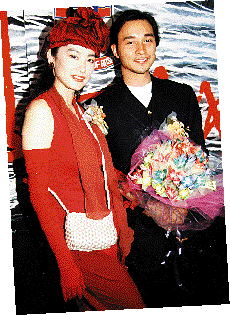GOLDSEA | ASIAMS.NET | ASIAN AMERICAN PERSONALITIES
LESLIE'S DEMONS
PAGE 3 OF 4
His personal life is his own business, but the roles Cheung has accepted in recent years tend to question heterosexual protocol. He's A Woman, She's A Man and its sequel, He's A Woman, She's A Man were directed by Peter (Comrades: Almost A Love Story) Chan, and featured Cheung as a jaded record producer who plays Pygmalion to an extremely cute young boy-wonder, and finds himself attracted to the moppet (played by ultra-cute Anita Yuen in male drag).
| In his world, the distinction between reality and dream, life and the state, male and female, life and death, the real and the imagined, is blurred. |
Screwball comedy is nothing new to Leslie, who has also appeared in several New Year comedies--family pictures made for release during Chinese New Year, a golden opportunity for Asian box offices.
Cheung's film resume contains all of the above, yet many viewers associate him primarily with artsier efforts more suited to film festivals than Chinatown haunts.
Rouge (1988), was directed by Stanley Kwan, and co-starred Canto-pop sensation Anita Mui. "Rouge moves at a languorous pace, with a haunting, sad mood uninterrupted by shock, gore, or slapstick", said film critic Jim Morton. A sad yet lovely film, Rouge was the first of a series of art-house costume dramas for Cheung's resume.
Cheung's collaborations with mainland director Chen Kaige have received international acclaim. Cheung's female counterfoil here, Shenyang-born Gong Li, has been lauded for her roles in the films of fellow mainlander Zhang Yimou. Chen's latest, Temptress Moon (1996), is a period piece situated in Shanghai and nearby Suzhou in the 1920's. TM spins streams of opium smoke as it explicates the tragic tale of the Pang clan, an old-school patriarchy unable to cope with the political changes of twentieth-century China. Cheung plays a young idealist who is quite literally Shanghaied, before returning to the Pang fold at Suzhou for the film's endgame. The film's lush look is courtesy of two Wong Kar-wai veterans: cinematographer Christopher Doyle and art director William Chang.
Farewell To My Concubine (1993) is a three-hour epic which spans five decades in the lives of two Peking Opera stars. Cheung stars opposite mainland actor Zhang Fengyi, and the film encompasses dramatic elements of Chinese history from the warlord-ruled Beijing of the 20's to the end of the Cultural Revolution in the 70's. FTMC was awarded the Palme d'Or for Best Film in 1993.

"The character that most fascinates me is that of Cheng Dieyi, played by Leslie Cheung," said Chen of Concubine. "Cheng is an actor. In his world, the distinction between reality and dream, life and the state, male and female, life and death, the real and the imagined, is blurred. Making no distinction between self and the other, he has dissolved life and the opera one into the other, so that when we witness his final act of self-destruction, it seems like a beautiful play. Leaving the stage to join the masses of ordinary people going about the normal business of life, such a person is doomed to loneliness and isolation. Yet it's precisely because of this that his naivete, sincerity, and even his biases and jealousy are beautiful and real. He reveals to us the nature of infatuation."
Canto-pop is not a fluid medium. Cantonese, the Chinese dialect spoken throughout Hong Kong and southern China, consists of at least seven distinct tones which vary the meaning. Combine this with a melody and you have some idea of why popular singer Sally Yeh once complained that singing Canto-pop was like "singing in prison." Thus, most Canto-pop is rigidly formulaic; sweet or strong love ballads with little bite or variety. Very few singers (Beijing-born Canto-diva Faye Wong is a notable exception) have attempted to break that golden mold.
"In Hong Kong, fame is based on luck, fortune and looks," says 16-year-old Canto-sensation Nicholas Tse. "It ain't based much on music."
"Producers keep doing the same thing over and over, and in return, they make the most money," concurred singer Alex To.
Naturally, Canto-pop's biggest consumers are teenage girls to whom the impossibly handsome visages of Canto-stars like Leon Lai or Andy Lau are more compelling than the pimply, girl-wary geeks in their bio classes. For them, the sugar-chute is the obvious route. But older folks also dig Canto-pop on laser-karaoke discs and video CD's, as musical accompaniment to their own singing adventures on the level playing field of karaocracy, where everyone's a star. Sing-alongs are so popular in HK that it's impossible to buy a videodisc player without a karaoke microphone input or two. Laser-karaoke imagery usually consists of the singer bopping around on a beach or similar innocuous environment. PAGE 4
|Page 1 | 2 | 3 | 4 | Some Films Starring Cheung |
CONTACT US
|
ADVERTISING INFO
© 1996-2013 Asian Media Group Inc
No part of the contents of this site may be reproduced without prior written permission.
